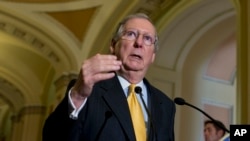A top U.S. lawmaker who has long been a critic of Burma's former military government says he is ready to end key sanctions against the reforming Southeast Asian nation, despite lingering human rights concerns.
Senate Republican leader Mitch McConnell made his comments Tuesday after meeting with Burmese President Thein Sein, who this week became that country's first head-of-state in nearly 50 years to visit the White House.
McConnell said he would not support congressional renewal of a ban on imports from Burma. He said to do so would be a "slap in the face" to reformists and would embolden those who want to slow or reverse the changes.
Burma's nominally civilian government took power in 2011, and has since enacted a series of rapid economic and political reforms. In response, Washington has suspended most of its economic sanctions against Burma, including the import ban.
If the annual legislation were allowed to expire, as McConnell has suggested, the White House could not re-instate the ban if Burma fails to continue making democratic progress.
Critics say such a move would waste valuable diplomatic leverage. They also say Burma's military dominated government has failed to address several important and long-standing human rights abuses.
Four Democratic lawmakers, including House Democratic leader Nancy Pelosi, met Tuesday with President Thein Sein, presenting him a list of nearly 250 political prisoners thought to still be jailed in Burma. The letter also called for an end to attacks on Burma's minority Muslims, who have been the victims of widespread discrimination and a worsening campaign of violence led by nationalistic Buddhist monks.
McConnell on Tuesday acknowledged that more reforms need to be made. But he argued that Congress could retain leverage with other remaining sanctions, such as a ban on gems - an important source of revenue for the Burmese military. He also said failing to lift the sanctions means U.S. businesses would lose out on opportunities to competitors in other countries that already have lifted trade restrictions on Burma.
McConnell has been one of Washington's staunchest supporters of the sanctions and of Burmese opposition leader Aung San Suu Kyi. His new position represents a major success for President Thein Sein, who has long called for an end to the import ban. Before leaving Washington, the Burmese leader also secured a key trade deal with the Obama administration.
A member of Thein Sein's delegation, Deputy Burmese Commerce Minister Pwint San, signed the agreement with acting U.S. Trade Representative Demetrios Marantis on Tuesday.
Marantis' office said the Trade and Investment Framework Agreement calls for the United States and Burma to identify business "initiatives" that support ongoing Burmese reforms and development projects that benefit the Burmese people.
Some information for this report was provided by AP, AFP and Reuters.
Senate Republican leader Mitch McConnell made his comments Tuesday after meeting with Burmese President Thein Sein, who this week became that country's first head-of-state in nearly 50 years to visit the White House.
McConnell said he would not support congressional renewal of a ban on imports from Burma. He said to do so would be a "slap in the face" to reformists and would embolden those who want to slow or reverse the changes.
Burma's nominally civilian government took power in 2011, and has since enacted a series of rapid economic and political reforms. In response, Washington has suspended most of its economic sanctions against Burma, including the import ban.
If the annual legislation were allowed to expire, as McConnell has suggested, the White House could not re-instate the ban if Burma fails to continue making democratic progress.
Critics say such a move would waste valuable diplomatic leverage. They also say Burma's military dominated government has failed to address several important and long-standing human rights abuses.
Four Democratic lawmakers, including House Democratic leader Nancy Pelosi, met Tuesday with President Thein Sein, presenting him a list of nearly 250 political prisoners thought to still be jailed in Burma. The letter also called for an end to attacks on Burma's minority Muslims, who have been the victims of widespread discrimination and a worsening campaign of violence led by nationalistic Buddhist monks.
McConnell on Tuesday acknowledged that more reforms need to be made. But he argued that Congress could retain leverage with other remaining sanctions, such as a ban on gems - an important source of revenue for the Burmese military. He also said failing to lift the sanctions means U.S. businesses would lose out on opportunities to competitors in other countries that already have lifted trade restrictions on Burma.
McConnell has been one of Washington's staunchest supporters of the sanctions and of Burmese opposition leader Aung San Suu Kyi. His new position represents a major success for President Thein Sein, who has long called for an end to the import ban. Before leaving Washington, the Burmese leader also secured a key trade deal with the Obama administration.
A member of Thein Sein's delegation, Deputy Burmese Commerce Minister Pwint San, signed the agreement with acting U.S. Trade Representative Demetrios Marantis on Tuesday.
Marantis' office said the Trade and Investment Framework Agreement calls for the United States and Burma to identify business "initiatives" that support ongoing Burmese reforms and development projects that benefit the Burmese people.
Some information for this report was provided by AP, AFP and Reuters.





